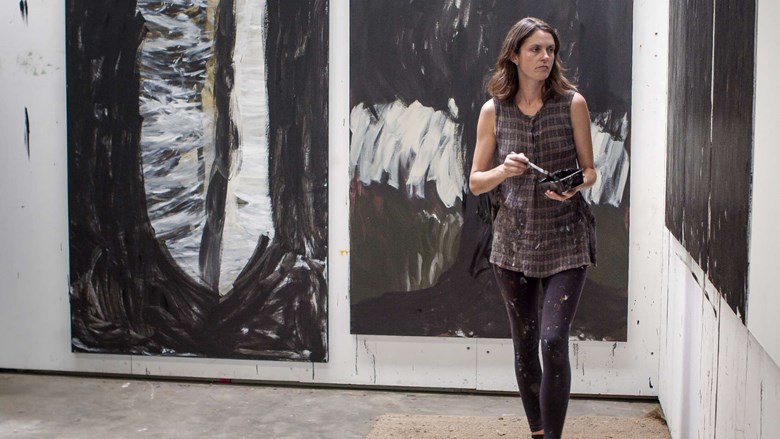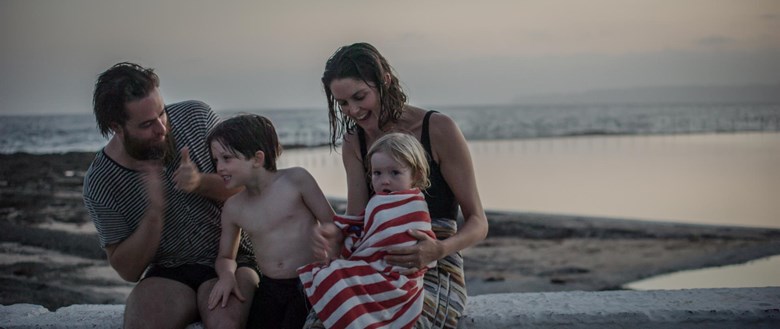Newcastle-based artist, sculptor & performer
"Newcastle is a place where I can clearly see myself growing old in."
Lottie Consalvo is a Melbourne-born, Newcastle-based artist whose practice traverses painting and performance. Most recently Consalvo’s work explores the distant self and its parallels to the expanse of the sea.
She is married to another local artist, James Drinkwater and they have two children called Vincenzo and Hester.
As part of the Peninsula City Project, I recently had the pleasure of sitting down for a chat with Lottie to gain an insight as to how she is making Newcastle her story (#MakeItYourStory). We captured a short story vignette of her with the ones she loves on film. Below are some of her extended thoughts from that interview that I believe you will find up-lifting.
With the other places that you have lived and worked in the world, why Newcastle?
After living in Germany pursuing our practice in Berlin and Leipzig, we eventually moved back to Australia and settled in Newcastle.
I met James in Melbourne, where I grew up. He was born and bred in Newcastle. One could say that I am here for love, ... technically, I brought him back to Newcastle (flashing a smile).
In reality, my connection to Newcastle has always been there. Coincidentally, my father is also from Newcastle and I have many memories of visiting for Christmas to visit my Nonna. She immigrated to Newcastle in the fifties which gave me a rich heritage to this place.
This is why I have always had a very romantic connection to Newcastle — since I was a little girl. While I grew up in country Victoria, my connection with this City fostered an affinity for the ocean and it eventually drew me here to live. We have lived at Merewether and now in Newcastle East, and I am now a person who must live where land meets the sea.
More broadly, it is exciting to be part of a city that is experiencing change and growth. This represents a key aspect to why we moved back and we didn’t want the distractions that come with a big city while pursuing our ideas and work.

How do you describe the actual qualities of life near the sea?
When we lived and worked in Paris, I felt a sense of claustrophobia, a land-lock feeling of wondering, where is that horizon, where is that place where you experience a true sense of infinity? … that the ocean gives.
Living by the sea has become a vital quality in my life and work. I enter the ocean almost every day, sometimes three times a day, and it has become an important ritual. It serves to reset my senses and lifts the veil for me to see so much more in many aspects to my life. Even when I am in the house, I have this greater sense of the ocean being near, like a living breathing organism. I am very aware of how that impacts on my mind and body.
My favourite time of the day is just after sunset when it is as if the sky and ocean meet and almost becomes one. I take my children there to experience this gift and it calms their spirit before they sleep.
I try my best to walk them by the sea before school, so they can connect with the natural rhythms of the ocean before they enter the formulated structure of school, as we all do with our work. This keeps them connected to what isn’t structured, acquainting them with the spontaneity of the sea and how it reflects the big picture of life. I believe it is a vital lesson for my children to experience and manage this duality… moving in and out of this natural form of magic.
What have you learned from living and working in other cities?
Living in other cities is something that both James and I have explored and I have exhausted this idea in my imagination. I know what it means to live in a big city and now that I am living in a smaller city (while still being close to the other big cities in the country) I am discovering that being in a place where there are still so many possibilities is exciting.
Newcastle is a place where I feel I can grow and be a part of a City in a very meaningful way. I don’t feel like I am part of such a big thing that I am absorbed to a point where I am either distracted or don’t quite have a place to exist. It is a place where I can travel from, and know I have a base in which I feel a strong sense of belonging.
The city is in a period of flux and experiencing big changes. Right now, it is very important that we cultivate what makes the city unique. It is a place that we can do very contemporary things in, and because of its size, the city is quite agile and can adapt quickly to what has virtue and is sustainable. It is definitely a place where we can start things from and hopefully redefine progress. Newcastle is a place where I can clearly see myself growing old in.

How would you define a modern city?
A modern city to me is one that learns from its past. We have all heard the term sustainability being bounced around repeatedly, and in our case, it is extremely relevant, given how past industrial practices. While many jobs were created, the natural environment, and many aspects of our harbour and city streets were left to become derelict.
What role do artists have in creating modern cities?
While living and working in Berlin, we witnessed the city employ new policies that make space for artists to work and exhibit, and thereby invigorate the built environment. They create a sense of wonder for people moving around and exploring the city streets.
As Newcastle becomes a bigger city, it has a great opportunity to continue to embrace and facilitate this as a policy for City planners.
Cities around the world are re-discovering that it is smart to ensure that creatives stay in the heart of the city to create a sense of intrigue for people that visit, live and work within the city.
Historically, this has been part of our culture, which has defined and excited people about Newcastle. In light of the new development that we are experiencing, it is my hope that we don’t lose this vital quality of our City’s tradition and culture.

This event is proudly supported by the City of Newcastle.




